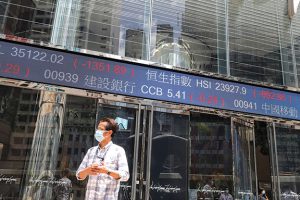Bloomberg
Hong Kong’s stock exchange is planning to allow cash market traders to use multiple banks to settle transactions, a move that will help diversify risks and may also mitigate the dangers posed by any escalation in sanctions by Washington and Beijing.
Hong Kong Exchanges & Clearing Ltd (HKEX) is drawing up plans to allow traders to sign up multiple clearing banks, up from the current one, according to people familiar with the matter who asked not to be identified discussing internal plans. A change would follow a similar relaxation in futures clearing rules in March. Clearing banks settle transactions
between two parties.
Chief Executive Office Nicolas Aguzin has faced a tough environment since taking over last year, battling a drought in initial public offerings. He has vowed to reorganise the bourse to better serve clients and improve its operations through market structure enhancements. The clearing change will match a set-up by its main Asian rival, Singapore.
“HKEX is committed to continually enhancing its market infrastructure to support the competitiveness and resilience of our markets,†a spokesperson said. “We will update the market should there be new developments.â€
Allowing multiple clearing banks helps funds diversify risk by protecting trading should the clearer run into trouble. It would also add privacy for funds who can clear their trades with several banks, limiting insight. The expansion would also give asset managers more bargaining power to choose a provider with better services and fees.
Brokers on the HKEX can choose to clear their own trades or outsource clearing functions to a general clearing participant.
Currently there are only eight general providers for the cash market, including Goldman Sachs Group Inc., Citigroup Inc., HSBC Holdings Plc and BNP Paribas SA, due to high capital requirements. Of the current authorised clearing banks, five are European and the rest are from the US.
The planned expansion is also seen as helping traders grappling with US sanctions that have been imposed on a bevy of Chinese firms. Many passive funds still trade
US-sanctioned stocks, such as China Mobile Ltd, the 11th biggest member in the benchmark Hang Seng Index, and signing up with a non-US bank could provide more of
a backstop.
Chinese funds could also tap a non-US counterpart in case Beijing retaliates with its own sanctions.
So far US banks can clear trades in sanctioned companies as long as the ultimate investors aren’t US based.
“The flexibility of having an alternative clearing bank applies to China funds and US firms, both of which face sanctions implication under the current geopolitical environment,†said Paul Pong, managing director at a Hong Kong-based Pegasus Fund Managers Ltd.
 The Gulf Time Newspaper One of the finest business newspapers in the UAE brought to you by our professional writers and editors.
The Gulf Time Newspaper One of the finest business newspapers in the UAE brought to you by our professional writers and editors.
